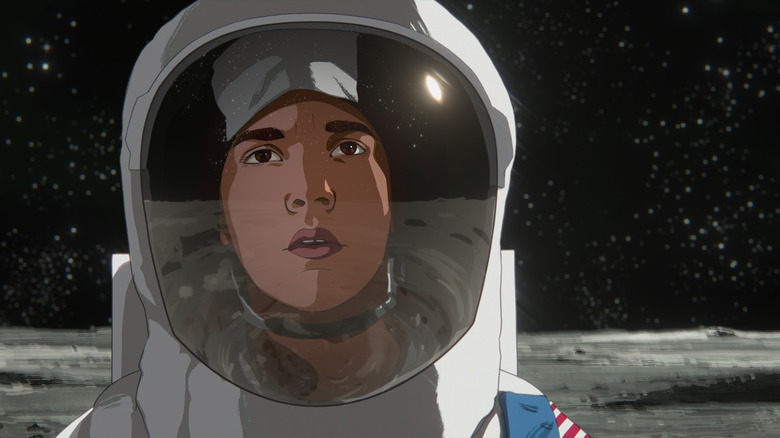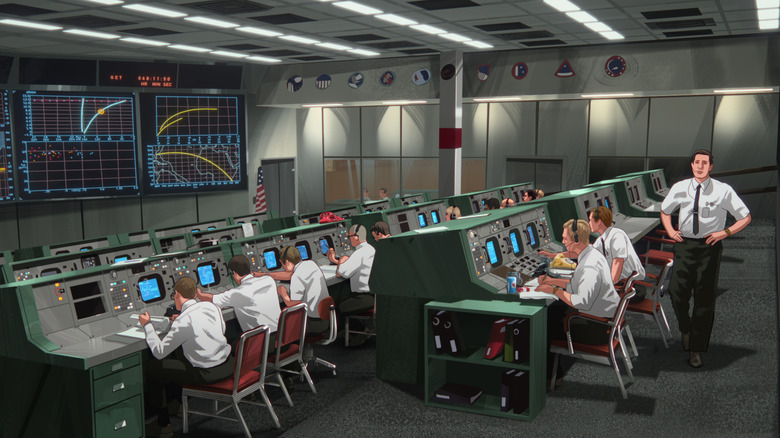Apollo 10 1/2 Review: A Rotoscoped Home Movie About The Space Race
Many, though not all, of Richard Linklater's films have a distinct, almost proud, sense of being homegrown and personal. Though Linklater isn't quite as involved as fellow Texas-based filmmaker Robert Rodriguez, at least in terms of exactly how many roles within a given film he can take on, his films are imbued with a passion associated with the awareness that no one else could tell these stories, because they are specifically Linklater's stories to tell. That passion is very much on display in the well-meaning, if not terribly involving, new animated film "Apollo 10 1/2: A Space Age Childhood," the auteur's first with the streaming giant Netflix. This is a sweet, friendly, low-key affair that often feels less like a story and more like a home movie Linklater collected to share with his grandkids.
It's not a very wild leap to make regarding Linklater's intent here, considering that one of the last lines of dialogue in "Apollo 10 1/2" features the lead character's father (Bill Wise) saying that he wants to be sure his son can tell his grandchildren one day that he watched American astronauts land and walk on the surface of the Moon. The historic and groundbreaking NASA launch of Apollo 11, climaxing in Neil Armstrong and Buzz Aldrin walking on the Moon on July 20, 1969, is the main thrust of "Apollo 10 1/2," though with a playful twist: early on, our lead Stan (Milo Coy) is surprisingly tasked at random by two NASA officials (Zachary Levi and Glen Powell) to test out the lunar module because they worry it might be too small for grown men to safely use. But that's barely even window dressing on what "Apollo 10 1/2" appears to be about: Linklater, who Stan seems to be a clear stand-in for, talking about what it was like to grow up in the space age of the 1960s right in the middle of the action.
Yet there isn't so much action in "Apollo 10 1/2" as there is television, and there is a lot of television in this streaming movie. A lot. The truest hook of this film is that, like Linklater's 2001 indie darling "Waking Life," it has been rendered in rotoscope-style animation. So that means you won't have to look twice at Levi's NASA official to recognize him, just having been re-animated after being filmed in live-action. It also means that when we watch Stan and his siblings watch everything from "The Twilight Zone" to "The Wonderful World of Color" to the Moon landing itself and its coverage on CBS by anchor Walter Cronkite, it's all rotoscoped, down to the twinkle in Cronkite's eye in now-legendary footage as he marveled at the sight of astronauts on the Moon.
Look back in pleasure
"Apollo 10 1/2" briefly acknowledges some of the tumult and upheaval occurring in the world, let alone America, in the late 1960s, almost always through snippets on television. There are short glimpses of the Vietnam War, of racial and gender inequity being fought against by so-called hippies, yes, but this movie is otherwise as positively nostalgic as a modern title gets. That nostalgia is assisted by a heaping amount of voiceover narration courtesy of Jack Black, portraying the older version of Stan. Often, voiceover narration in a coming-of-age story is there to set the scene before mostly vanishing until the finale. In "Apollo 10 1/2," the near-opposite is true, as Black almost certainly has the most dialogue in the film, far more than anyone else. Black has done some of his best work with Linklater, in films like "School of Rock" and "Bernie," but he goes for a more straightforward take here in what amounts to Linklater's version of "The Wonder Years." Though the writer/director bucks the trend of using more, not less, narration, it ends up stifling any true creative throughline here. What we know about Stan and his family is provided through "tell more than show"-style narration.
So what does end up working, when it works, in "Apollo 10 1/2" is the animation itself. Both in how Linklater depicts Stan suiting up as an astronaut in his imaginative flight of fancy, as when he presents the real Moon landing, the animation is almost blindingly bright and impressively detailed. Here's a case where the nostalgia of a given set of memories lines up perfectly with the style in which it's depicted. No doubt the real experience of living in Houston in the 1960s wasn't always quite as rosy as Linklater presents it to be, even just from his personal point of view. But rotoscoping animation as utilized here allows for a storybook quality. What Linklater does in using this style of animation is bring his past to life in ways far beyond what live-action can do.
The unfortunate side effect of that, however, is that "Apollo 10 1/2" just kind of feels like a string of home movies with a gussied-up style. That moment near the end where Stan's dad expresses his desire to pass on the memory of the Moon landing is both perfectly understandable — the closing text notes that men haven't walked on the Moon for 50 years, allowing for the hope that they may do so again — and so bald-faced that it's a bit shocking the words "THIS IS THE THEME" don't appear at the bottom of the screen. "Apollo 10 1/2: A Space Age Childhood" is well-intentioned, well-rendered, and so upbeat in its existence that criticizing it may feel unnecessary. But this director, this style, and this setting could've made for something a bit more powerful.
/Film Rating: 5.5 out of 10

